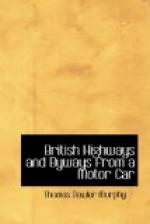There are three ways in which a tourist may obtain a good idea of Britain during a summer’s vacation of three or four months. He may cover most places of interest after the old manner, by railway train. This will have to be supplemented by many and expensive carriage drives if he wishes to see the most beautiful country and many of the most interesting places. As Professor Goldwin Smith says, “Railways in England do not follow the lines of beauty in very many cases,” and the opportunity afforded of really seeing England from a railway car window is poor indeed. The tourist must keep a constant eye on the time-tables, and in many of the more retired places he will have to spend a day when an hour would suffice quite as well could he get away. If he travels first-class, it is quite expensive, and the only advantage secured is that he generally has a compartment to himself, the difference in accommodations between first and third-class on the longer distance trains being insignificant. But if he travels third-class, he very often finds himself crowded into a small compartment with people in whom, to say the least, he has nothing in common. One seldom gets the real sentiment and beauty of a place in approaching it by railway. I am speaking, of course, of the tourist who endeavors to crowd as much as he can into a comparatively short time. To the one who remains several days in a place, railroad traveling is less objectionable. My remarks concerning railroad travel in England are made merely from the point of comparison with a pleasure journey by motor, and having covered the greater part of the country in both ways, I am qualified to some extent to speak from experience.
For a young man or party of young men who are traveling through Britain on a summer’s vacation, the bicycle affords an excellent and expeditious method of getting over the country, and offers nearly all the advantages of the motor car, provided the rider is vigorous and expert enough to do the wheeling without fatigue. The motor cycle is still better from this point of view, and many thousands of them are in use on English roads, while cyclists may be counted by the tens of thousands. But the bicycle is out of the question for an extended tour by a party which includes ladies. The amount of impedimenta which must be carried along, and the many long hills which are encountered on the English roads, will put the cycle out of the question in such cases.
In the motor car, we have the most modern and thorough means of traversing the highways and byways of Britain in the limits of a single summer, and it is my purpose in this book, with little pretensions to literary style, to show how satisfactorily this may be done by a mere layman. To the man who drives his own car and who at the outstart knows very little about the English roads and towns, I wish to undertake to show how in a trip of five thousand miles, occupying about fifty days, actual traveling time, I covered much of the most beautiful country in England and Scotland and visited a large proportion of the most interesting and historic places in the Kingdom. I think it can be clearly demonstrated that this method of touring will give opportunities for enjoyment and for gaining actual knowledge of the people and country that can hardly be attained in any other way.




